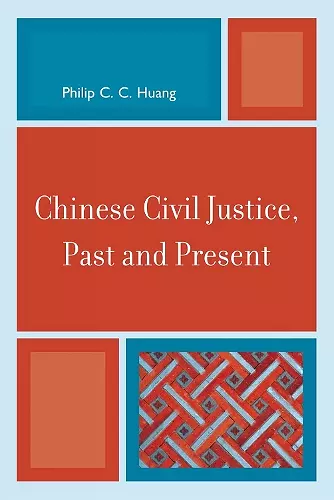Chinese Civil Justice, Past and Present
Format:Paperback
Publisher:Rowman & Littlefield
Published:30th Jul '12
Currently unavailable, and unfortunately no date known when it will be back
This paperback is available in another edition too:
- Hardback£87.00(9780742567696)

The culmination of twenty years of research, this essential book completes distinguished historian Philip C. C. Huang's pathbreaking trilogy on Chinese law and society from late imperial times to the present. Huang shows how, at the level of ideology and theory, traditional Chinese law has been rejected time and again in the past century by China's own lawmakers, first in the late Qing and the republic, then in the revolutionary and Maoist periods of the People's Republic, and finally again in the current reform era. Considering legal theory alone, modern Chinese law can only be Western law, and past Chinese law—traditional or Maoist—can have no role under the leadership's current preoccupations with modernization and marketization. But what has actually happened historically at the level of judicial practice and the daily lives of common people? In exploring this central question, Huang draws on a rich array of court records and field interviews to illustrate the surprising strength of traditional Chinese civil justice. Albeit much altered, its legacy can be traced in informal and semiformal community justice (e.g., societal and cadres mediation), as well as in multiple spheres of court-administered formal civil justice, including property rights, inheritance and old-age maintenance, and debt obligations. He also identifies the influence of Maoist justice, especially its divorce and civil court mediation practices. Finally, despite the reform era's massive importation of Western laws, legal reasoning employed in judicial practice has shown remarkable continuity, with major implications for China's future legal system.
In this book Huang demonstrates the extent to which key aspects of late imperial civil law—the deliberate gulf between representation and practice and the emphasis on community mediation—have survived the hegemonic weight of 'modern' Western formal law under the Chinese Republic, and again in the current reform era. This is a magnificent example of the uses of history to understand the puzzles of contemporary reality. -- William T. Rowe, Johns Hopkins University
This wide-ranging, judicious, and thought-provoking volume is a fitting capstone to Philip Huang's previous work on law in Qing and Republican China. Huang makes a strong and convincing case for the relevance of Chinese legal history to law in modern China while offering fascinating insights into the modern Chinese legal system. -- Donald Clarke, George Washington University
This rich study . . . represents the culmination of two decades of research and publication. . . . [Huang] devotes most of the book to demonstrating the ways in which the adaptation of earlier Chinese legal practices has nonetheless continued down to the present, creating a distinctively Chinese modernity. . . . Huang makes a strong case for how crucial it is to understand China’s past if we are to make sense of the present and make predictions for the future. This book will be of great interest not only to those interested in law, Chinese and comparative, but also to all wrestling with the complicated and still unresolved question of the nature of modernity, Chinese and other. -- Joanna Waley-Cohen, New York University * American Historical Review *
We are much indebted to Professor Huang for a major advance in our knowledge and understanding of Chinese civil law. * Journal of Asian History *
Philip Huang’s new book completes his research on the subject over the past twenty years and enriches Chinese legal history and legal studies with new perspectives. The most significant contribution of the book lies in the arguments and evidence presented that compel one to move beyond a binary view, informed by Max Weber, of the modernist Western legal system vis-à-vis the traditionalist Chinese legal system. At the same time, based on substantial case records . . . the book reveals convincingly the continuity in Chinese civil justice from the Qing dynasty to the post-Mao reform era, both in legal practices and in an underlying mode of thinking. . . . Philip Huang has established a milestone in the study of Chinese civil justice. No future research into the subject for any historical period can seriously proceed without first consulting this book. * China Review International *
ISBN: 9780742567702
Dimensions: 228mm x 152mm x 23mm
Weight: 476g
316 pages